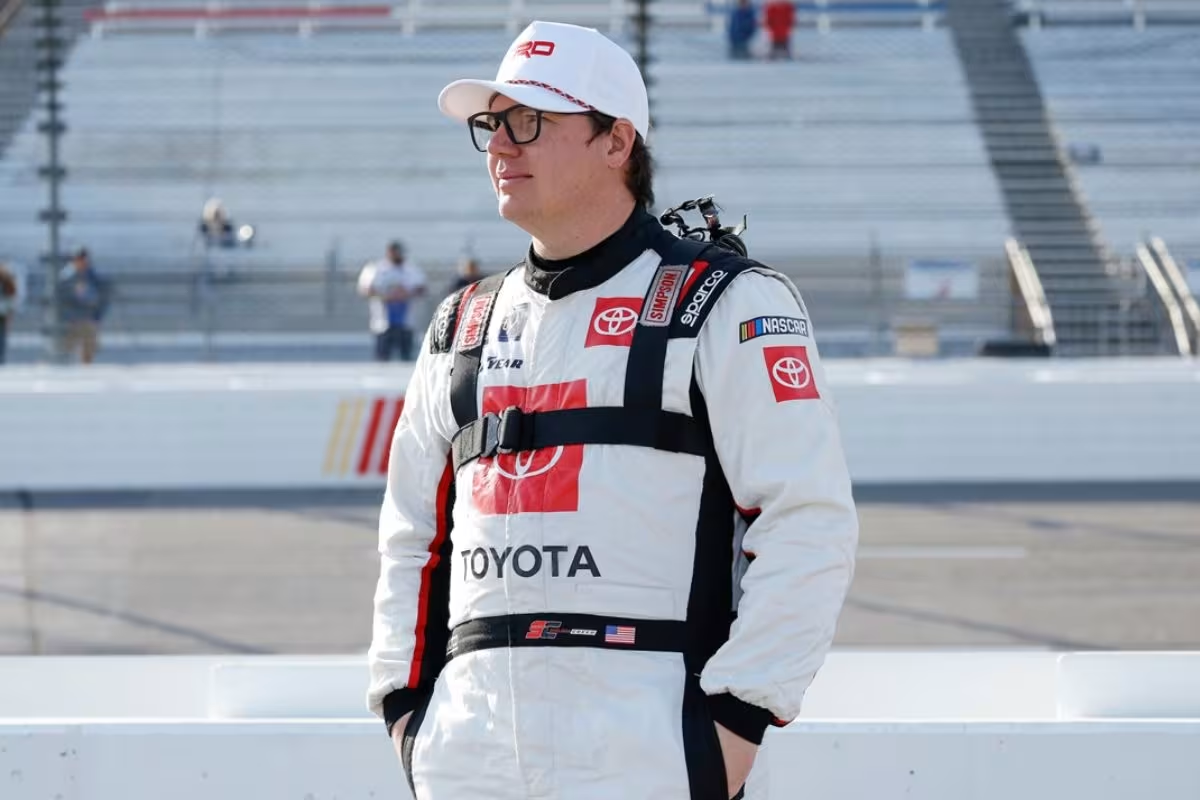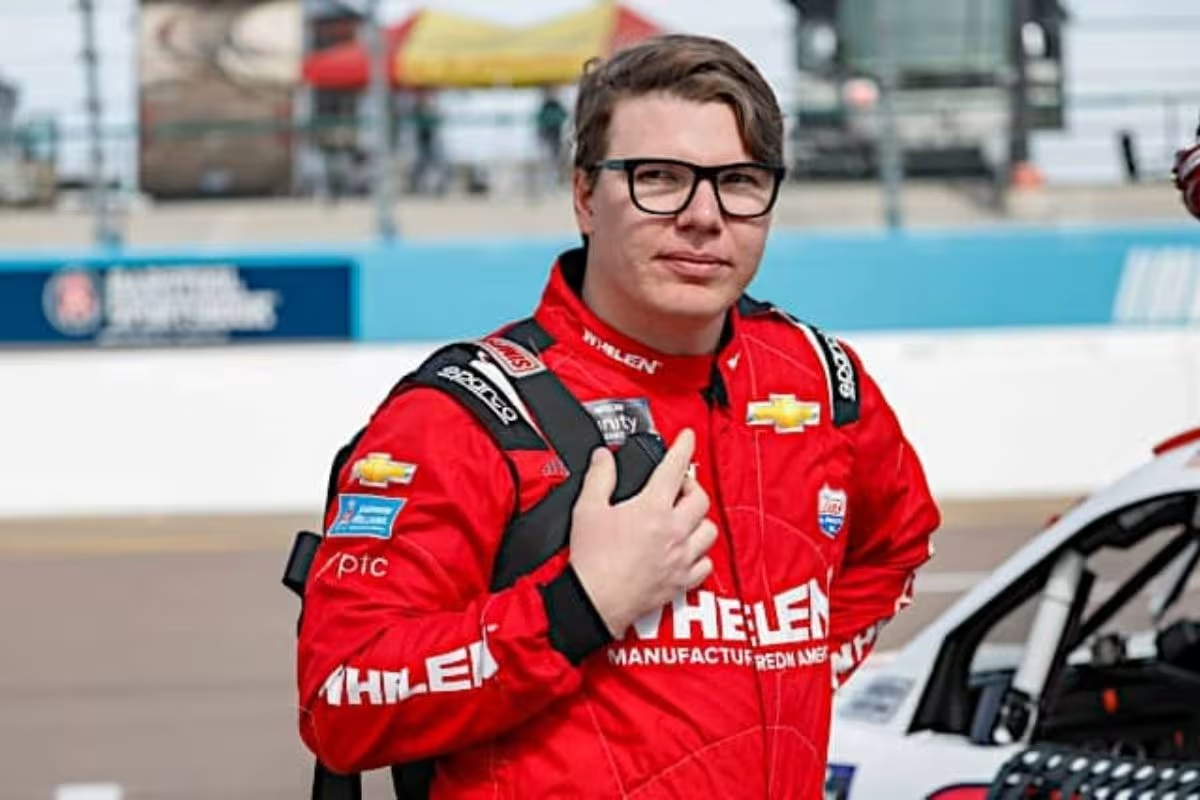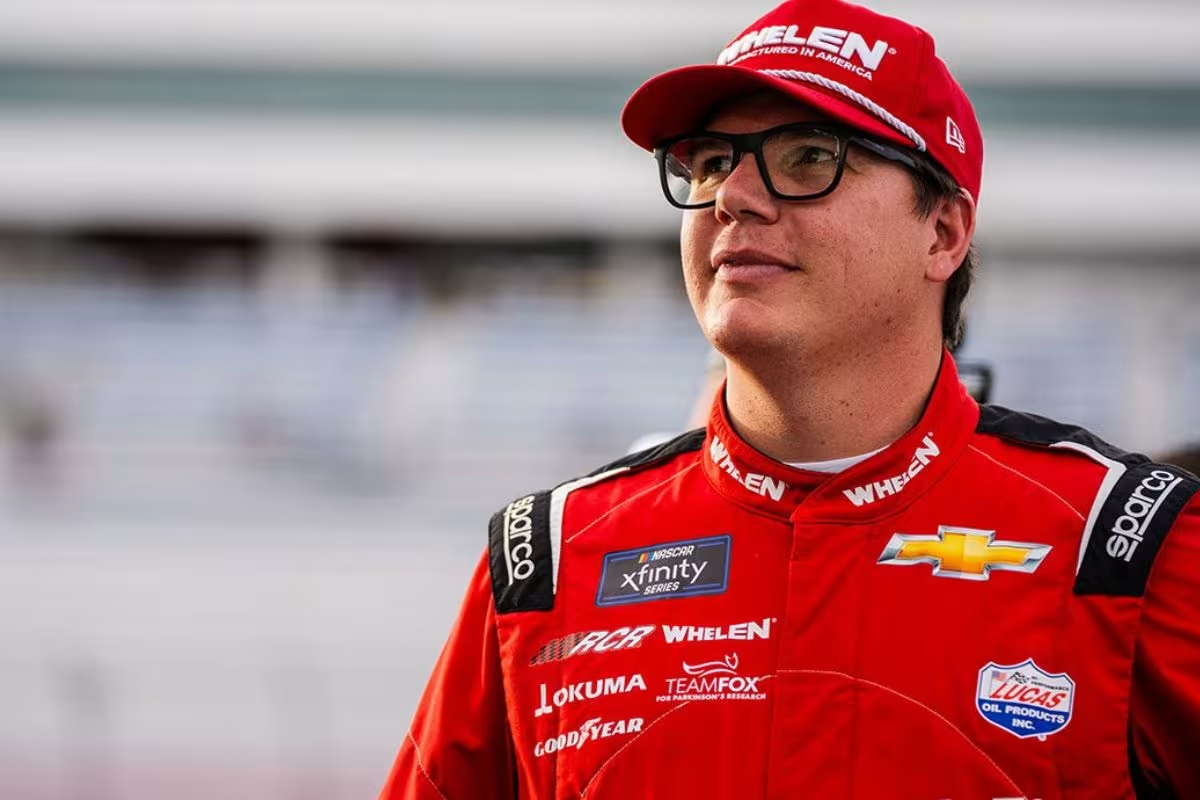Sheldon Creed’s Self-Bet for NASCAR Glory: Sheldon Creed‘s tactical move to Joe Gibbs Racing marks a pivotal moment in his NASCAR career, reflecting a calculated risk that prioritizes long-term growth over short-term gains. His track record, featuring 13 top-five finishes and a championship title, positions him as a formidable contender in the Xfinity Series. However, the psychological toll of previous near-victories looms large, raising questions about his mental fortitude. As Creed seeks to transform potential into tangible success, one must consider whether this ambitious gamble will indeed yield the glory he envisions or lead to unforeseen challenges ahead.
Key Highlights
- Sheldon Creed’s transition to Joe Gibbs Racing emphasizes self-investment, aiming for long-term growth and potential championship success in the Xfinity Series.
- With 13 top-five finishes and a championship title, Creed is strategically positioned for a strong performance in the 2023 Xfinity Playoffs.
- Building confidence from recent results, Creed’s mindset has shifted towards determination, essential for achieving his first Xfinity Series win.
- Overcoming the psychological burden of finishing second 13 times demonstrates Creed’s resilience and ability to learn from past experiences.
- A strong team dynamic within the No. 18 Toyota GR Supra fosters collaboration, increasing the likelihood of achieving Creed’s goals for future successes.
Overview of the Betting Culture in NASCAR
How does the betting culture within NASCAR reflect the broader dynamics of risk and reward in professional sports? At its core, the betting culture in NASCAR encapsulates a high-stakes gamble where drivers wager not only their reputations but also their future opportunities within the sport.
This phenomenon, while not novel, highlights a pervasive mindset among racers who are willing to put everything on the line in hopes of achieving recognition and securing lucrative sponsorships. The act of betting on oneself is emblematic of a broader narrative within professional sports, where athletes navigate a landscape fraught with uncertainty.
For some, this self-betting strategy can accelerate remarkable success, showcasing their talent to potential sponsors and team owners. However, the accompanying risks are considerable; for every driver who thrives under pressure, there are many others whose aspirations crash, resulting in missed opportunities and dashed hopes.
The duality of this culture—where the potential for reward is matched by the threat of failure—mirrors the essence of competition itself. It challenges drivers to push their limits, testing both their skill and psychological fortitude.
Yet, this relentless pursuit of success can also foster an environment rife with anxiety and volatility, as each race becomes a microcosm of their ultimate ambitions. Consequently, the betting culture in NASCAR serves as a compelling lens through which one can examine the intricate interplay of risk and reward that defines not only racing but the broader landscape of professional sports.
Sheldon Creed’s Career Move
Sheldon Creed’s shift to Joe Gibbs Racing represents a pivotal career move that embodies the essence of self-investment in the high-stakes world of NASCAR. By opting to join this championship-winning team, Creed has placed his faith—and financial resources—into a program renowned for cultivating talent. This tactical decision is not merely a leap of faith; it reflects a calculated bet on his own capabilities and the potential rewards that could follow.
Creed’s change from Richard Childress Racing to Joe Gibbs Racing is remarkable for its audacity. Rather than receiving compensation, he has dedicated his financial resources to guarantee he has a seat in one of the most competitive teams in the NASCAR Xfinity Series. This approach is emblematic of a growing trend among drivers who wish to enhance their careers through bold choices.
As Creed heads into the NASCAR Xfinity Series Playoffs, his decision to prioritize development over immediate financial gain seems to be bearing fruit. With a series-leading number of top-five finishes, he is positioned to make a considerable impact this season, demonstrating that sometimes the biggest risk can yield the greatest reward.
Confidence and Performance Improvement
There is no denying that confidence plays a crucial role in an athlete’s performance, and for Sheldon Creed, this season has marked a remarkable turnaround. Shifting to Joe Gibbs Racing, Creed faced a tough moment in his career, grappling with diminished self-assurance and a waning enjoyment of the sport.
“Yeah, I think it certainly has [helped my confidence]. I think I came to [Joe Gibbs Racing] pretty low on confidence and I’m not sure I was having fun with it anymore, and yeah, I think that’s all turned around. I think my confidence grows every week, [I] don’t want to say we should’ve won Darlington, but [we] were in position to win Darlington. So yeah, confidence has been up, and our team has had a lot of fun, Creed added. Running top-five every week is fun, right? It’s better than running sixth, or seventh, or eighth, or 12th to 15th.” -(creed)
However, the results have not only revitalized his competitive spirit but have also catalyzed a considerable increase in his confidence levels. Creed’s assertion that his confidence grows weekly is indicative of a broader psychological phenomenon observed in high-performing athletes: success breeds further success.
By consistently finishing in the top five, he has transformed his mindset from doubt to determination. The psychological impact of being in contention for wins—such as his near victory at Darlington—has reinforced this newfound self-belief. The exhilaration that accompanies competitive successes fosters a positive feedback loop that fuels further improvement.
Moreover, the collaborative atmosphere within his team has played a critical role in this transformation. Creed’s acknowledgment of the fun aspect of racing highlights the importance of a supportive environment in enhancing performance.
In NASCAR, a confident driver not only optimizes their own capabilities but also raises the team’s morale and effectiveness. As Creed continues to navigate the season, the interplay between his confidence and performance will be crucial in determining his path.
The question remains: can he maintain this momentum and capitalize on his confidence into sustained success on the track?
Overcoming Runner-Up Frustrations
Frustration often manifests as a formidable barrier in the pursuit of excellence, particularly in competitive sports like NASCAR. For Sheldon Creed, the sting of finishing second—a staggering 13 times without securing a victory in the Xfinity Series—could easily become a psychological hurdle. Yet, rather than succumbing to despair, Creed has chosen a path of resilience and introspection. His approach to these near-misses reveals a growth mindset that is fundamental for any athlete aspiring for greatness.
“Yeah, each situation has been different, I don’t think I’ve done the same mistake twice, right? I just try to learn and be better every single week. I mean, for a second there, it was getting annoying. I got annoyed with myself and why do I keep running second, but lately, I just haven’t cared and have been having a lot of fun being fast and consistent and in the picture of winning.”-(sheldon)
Creed’s acknowledgment of the unique circumstances surrounding each runner-up finish demonstrates a vital aspect of overcoming frustration: the ability to learn. By refusing to repeat the same mistakes, he has transformed disappointment into a learning opportunity, allowing him to refine his skills and strategies. His statement reflects a nuanced understanding of the competitive landscape, indicating that he views each race as a distinct challenge rather than a repetition of failure.
Creed’s recent shift in perspective—embracing the joy of being fast and consistent—highlights a significant psychological adjustment. By focusing on the process rather than the outcome, he has liberated himself from the weight of expectations. This shift not only fosters a healthier mindset but also improves performance, as enjoyment and confidence often correlate with success in high-pressure environments.
In a sport where the margins are thin, Creed’s ability to overcome runner-up frustrations will be vital. As he continues to adapt and evolve, it remains to be seen whether he can translate these lessons into a long-awaited victory.
This year, @SheldonCreed took a chance on himself by joining @JoeGibbsRacing, and it's paid off, leading the Xfinity Series in top-fives (13).
Creed says the success of that gamble has led to a turnaround in confidence, which he says continues growing each week.#NASCAR pic.twitter.com/1DWJpduB1x
— Joseph Srigley (@joe_srigley) September 24, 2024
Future Aspirations and Goals
As the dust settles on his near-misses, the focus for Creed shifts toward the horizon of his racing career, where future aspirations and goals take center stage.
“I feel like it’ll be a huge weight off my shoulders. This has been riding on me for three years now. Yeah, I don’t know, I’ll for sure be relieved. And it’s going to happen, one of these days. I thought it was going to happen just a couple of weeks ago at Darlington. Once we win, I have a feeling they’ll come a little easier and hopefully more often. I think at this point, where everything is at, you have to win races if you want to go to the Cup [Series] and have a paid-for ride and not have to bring money to a Cup team. That’s the goal. I think I’m consistent enough to maybe have Cup teams interested, but they want to see winners and I have to do that more often.”-(sheldon)
With eight victories in the NASCAR Craftsman Truck Series, Creed is acutely aware that success in the NASCAR Xfinity Series is essential for his progression to the Cup Series. His aspirations are defined by a few key objectives:
- Achieving His Initial Xfinity Series Win: Creed’s immediate focus is on securing that first victory, believing it will not only relieve pressure but also set a precedent for future successes.
- Establishing Consistency: He recognizes the necessity of winning to attract Cup Series teams that desire proven talent, emphasizing that consistency is vital to his long-term ambitions.
- Competing for a Championship: Creed aims to not only finish strong this season but also to contend for a championship with his current team, which he believes is well-positioned for success.
Creed’s steadfast belief in his capabilities aligns with the tactical moves he is making, such as taking the wheel of the No. 00 Ford Mustang Dark Horse for Haas Factory Team in 2025.
His confidence in the No. 18 Toyota GR Supra team reflects a collective dedication to excellence, suggesting that the groundwork for future triumphs is firmly in place.
Ultimately, every decision Creed makes is a calculated step toward fulfilling his dreams of NASCAR glory.
News in Brief: Sheldon Creed’s Self-Bet for NASCAR Glory
Sheldon Creed’s shift to Joe Gibbs Racing highlights a tactical commitment to long-term success in NASCAR. By prioritizing development over immediate financial gains, Creed aims to utilize his impressive performance history to secure a pivotal Xfinity Series victory. The psychological challenges of past near-wins serve as a crucible for growth and resilience, while aspirations for future Cup Series opportunities remain firmly in sight. This calculated risk may ultimately redefine Creed’s path and solidify his legacy in the sport.
ALSO READ: Insider’s Brutal Prediction for Sheldon Creed’s Future: “Poor B–tard Is Never Gonna Win”




